
Who are the big sharks of the Indian stock markets?
By Nasrin Sultana| May 24, 2023
Topping the chart is Radhakishan Damani, promoter of Avenue Supermarts that runs and operates retail format stores D-Mart. At the end of March, Damani's cumulative holding was worth Rs1.53 trillion
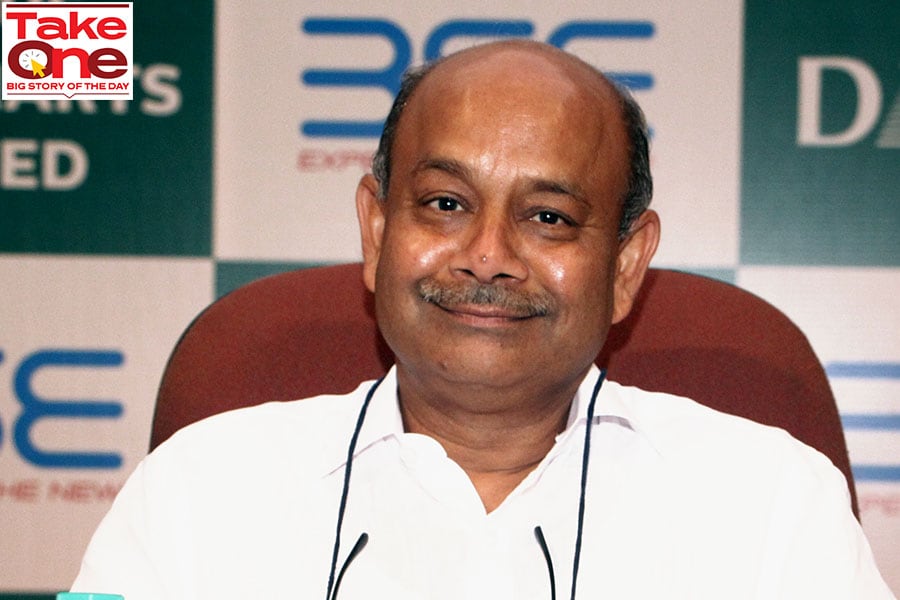 [CAPTION]Radhakishan Damani, an Indian billionaire investor and the founder of Avenue Supermarts Limited. [/CAPTION]
[CAPTION]Radhakishan Damani, an Indian billionaire investor and the founder of Avenue Supermarts Limited. [/CAPTION]
Even as the dramatic events of 2022 brought in sudden unprecedented changes and behavioural bias in investment strategies, a few remained persistent. Steep inflation, a long unwinding cycle of interest rates, abrupt geo-political factors wrecking capital markets and global financial crisis with an anticipated recession in history did little to wither the wealth or portfolio of large individual investors of Indian stock markets, often referred to as ultra high networth individuals (UHNI) or the super rich.
_RSS_A Forbes India analysis of India’s super riches’ portfolio in the three months ending March 2023 based on data provided by Prime Database reveal that these masters-of-the-game held on to their equity in companies even as overall markets tanked in the period. The analysis is based on shareholding patterns filed by 1,838 of the total 1,864 companies listed on NSE (main board) for the quarter ending March 31, 2023. The analysis includes portfolios of individual investors whose combined holding across multiple companies is more than Rs250 crore as on March 2023 and may include promoters as part of public shareholdings in few cases.
Topping the chart is Radhakishan Damani, promoter of Avenue Supermarts that runs and operates retail format stores D-Mart. At the end of March, Damani’s cumulative holding was worth Rs1.53 trillion. However, over the last quarter, it has declined 16.14 percent from Rs1.83 trillion in the October-December period. In percentage terms, his top holdings were Avenue Supermarts—where he cut exposure to 67.51 percent from 67.53 percent—the share price of which fell 16 percent during the three-month period. His other top holdings were VST Industries, India Cements, Trent and Sundaram Finance. 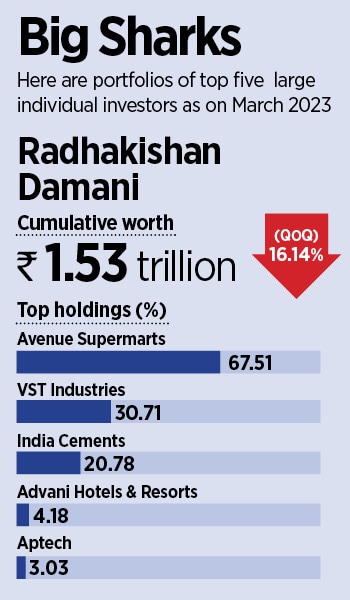 In value terms, Damani has raised his stake in 3M India, Trent and Aptech. The share prices of those stocks climbed 1-5 percent in the period.
In value terms, Damani has raised his stake in 3M India, Trent and Aptech. The share prices of those stocks climbed 1-5 percent in the period.
Next, with a wide margin gap, is the late Rakesh Jhunjhunwala, whose cumulative holding was Rs32,296 crore in March, falling by 3.61 percent from Rs3,506 crore in December. Jhunjhunwala invests in stocks through entities like Aryaman Jhunjhunwala Discretionary Trust, Aryavir Jhunjhunwala Discretionary Trust, Nishtha Jhunjhunwala Discretionary Trust, Rare Enterprises, Rare Equity Pvt.Ltd, Rajeshkumar Radheshyam Jhunjhunwala and his wife Rekha Rakesh Jhunjhunwala.
Jhunjhunwala’s love for the Titan stock is no secret, in which his stake was raised to 5.29 percent in March (from 5.17 percent). His holding in Sun Pharma Advanced Research also climbed to 1.94 percent, which was below 1 percent in quarter-ago period. Jhunjhunwala has highest exposure in Aptech, Star Health and Allied Insurance Company, Metro Brands, NCC and Rallis India.  [CAPTION]Late Rakesh Jhunjhunwala
Image: Mexy Xavier[/CAPTION]
[CAPTION]Late Rakesh Jhunjhunwala
Image: Mexy Xavier[/CAPTION]
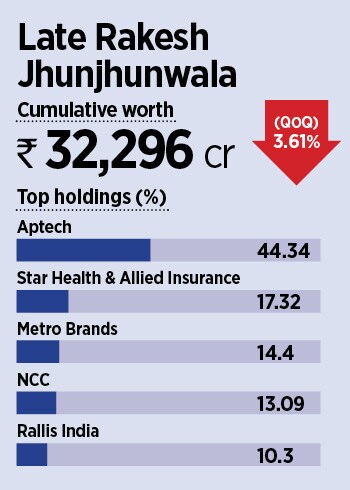 Top five companies in which Jhunjhunwala reduced his stake (by percentage terms) are Dishman Carbon Amcis, Autoline Industries, Edelweiss Financial Services, DB Realty and Nazara Technologies. Except Dishman Carbon Amcis, stock price of which jumped 31 percent, other four fell 10-31 percent in the three months period.
Top five companies in which Jhunjhunwala reduced his stake (by percentage terms) are Dishman Carbon Amcis, Autoline Industries, Edelweiss Financial Services, DB Realty and Nazara Technologies. Except Dishman Carbon Amcis, stock price of which jumped 31 percent, other four fell 10-31 percent in the three months period.
Also read: Misplaced exuberance drives Indian stocks as investors navigate 'hard times'
Third is maverick investor Hemendra Kothari, whose cumulative holding was Rs7,978 crore, a fall of 13.73 percent from preceding three months. Kothari’s investment entities include Aditi Hemendra Kothari Desai, Anjali Yogesh Kothari, Nini Yogesh Kothari, Shuchi Hemendra Kothari, Suneet Yogesh Kothari and Yogesh Mathradas Kothari. His top five favourite stocks in the portfolio are Alkyl Amines Chemicals, Sonata Software, Veranda Learning Solutions and EIH Associated Hotels.
Akash Bhanshali is the next with a cumulative holding of Rs3,616 crore (fell by 4 percent QoQ). He is the son of veteran investor Vallabh Bhansali’s late brother and Enam co-founder Manek Bhanshali. 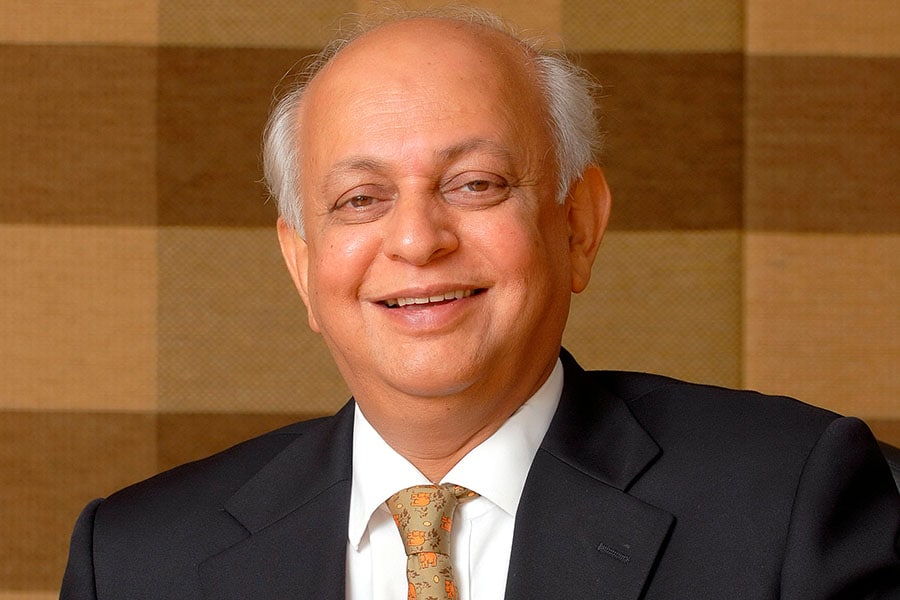 [CAPTION]Hemendra Kothari, a maverick Indian investor
Image: Umesh Goswami/The The India Today Group via Getty Images[/CAPTION]
[CAPTION]Hemendra Kothari, a maverick Indian investor
Image: Umesh Goswami/The The India Today Group via Getty Images[/CAPTION]
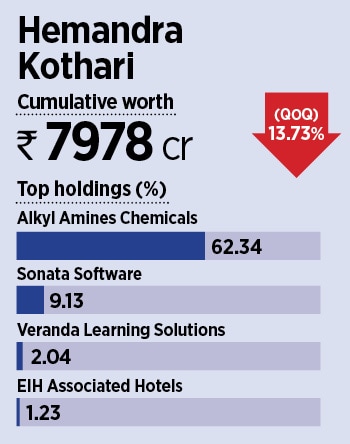 “No doubt, uncertainty is a deal breaker in stock markets, yet a deep assessment of these portfolios will show you consistency and discipline in the investment strategy, even when markets were in rough weather in the March quarter,” says a research analysts on condition of anonymity. The person adds that these portfolios also reveal a deep love for certain stocks that, to some extent, become an obsession and are seldomly sold off completely for years.
“No doubt, uncertainty is a deal breaker in stock markets, yet a deep assessment of these portfolios will show you consistency and discipline in the investment strategy, even when markets were in rough weather in the March quarter,” says a research analysts on condition of anonymity. The person adds that these portfolios also reveal a deep love for certain stocks that, to some extent, become an obsession and are seldomly sold off completely for years.
Indian markets, in tandem with its global peers, were in a tough situation in the January to March quarter. Benchmark indices Sensex and Nifty had declined nearly 3-4 percent while smaller stocks had taken a heavy beating. Foreign institutional investors (FIIs) were heavy sellers of Indian stocks in the three months: They sold shares worth Rs35,048 crore from oil, gas & consumable fuels, and financial services sectors during the quarter while investing Rs12,994 crore in the services and capital goods sectors. Domestic institutional investors (DIIs) were net buyers of stocks worth Rs83,200 crore in January to March.
“Looking to 2023, investors are still confronted with higher inflation, though the overall pressure has eased somewhat. Global central banks have reduced the pace of interest rate hikes, but the focus remains on reducing inflation,” says Daniel Rupli, head of single security research, Credit Suisse.
Rupli adds that geopolitical tensions and social instability have continued to make personal security concerns among the top worries for many individuals around the world. Now a sharp deterioration in the affordability of essential goods and services, from food, housing and heating to healthcare and education in response to last year’s inflationary shock poses yet another challenge.
Spotlights
The analysis shows that there are 27 large individual investors whose cumulative holdings were over Rs250 crore at the end of March 2023, despite a downturn in markets. We throw some light on portfolio of UHNIs who are not so popular.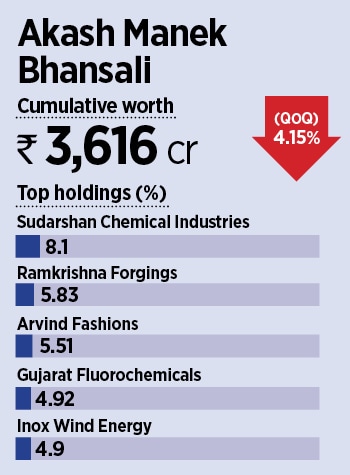 Anuj Anantrai Sheth, promoter of Anvil Share & Stock Broking Pvt, with cumulative holding of Rs1,139 crore has seen a decrease by 11.04 percent in a quarter. His top stocks are Themis Medicare, Bannari Amman Spinning Mills, Bannari Amman Sugars, Finolex Industries and Asahi India Glass.
Anuj Anantrai Sheth, promoter of Anvil Share & Stock Broking Pvt, with cumulative holding of Rs1,139 crore has seen a decrease by 11.04 percent in a quarter. His top stocks are Themis Medicare, Bannari Amman Spinning Mills, Bannari Amman Sugars, Finolex Industries and Asahi India Glass. Investor Tejas Trivedi’s cumulative holding is Rs1,132 crore, which fell by 8.46 percent in three months. His top bets are AstraZeneca Pharma, Centum Electronics, NOCIL, Atul and Asia Hyper Retail.
Sachin Bansal’s cumulative holding as on quarter ending March 2023 was Rs523 crore (also including Anandam Enterprises, Navodya Enterprises, SPV Enterprises, SPV Traders, Parveen Kumar Bansal, Seema Bansal and Vivek Bansal). Over the last quarter (since December 2022), this has decreased by 19.12 percent from Rs 647 crore.
Also read: Markets slippery, companies struggle to protect margins
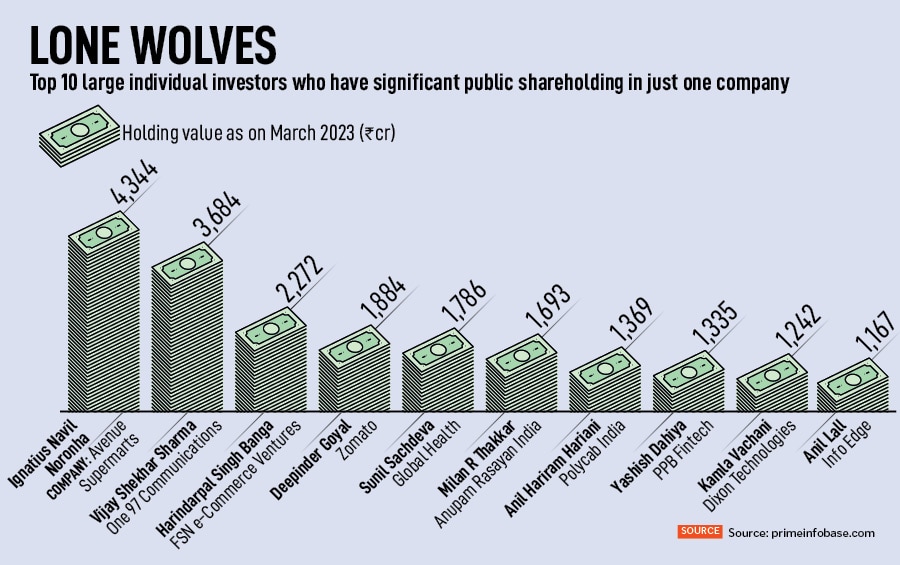
Lone Wolves
The analysis showed that there are 69 other large individual investors who have significant public shareholding in just one company, with value of holding more than Rs250 crore. Some of the names are Ignatius Naval Noronha (Avenue Supermarts), Vijay Shekhar Sharma (One97 Communications), Harindarapal Singh Banga (FSN E-Commerce Ventures), Deepinder Goyal (Zomato) and Sunil Sachdeva (Global Health). 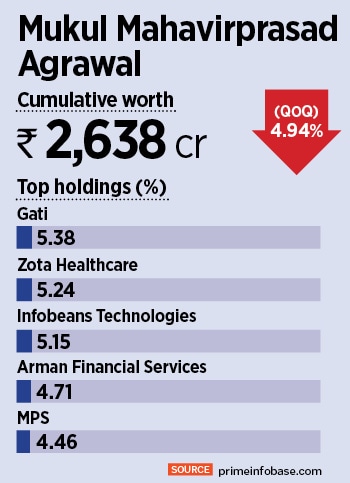 According to stock exchange data, Noronha holds 1.97 percent in Avenue Supermarts, Sharma holds 9.13 percent in One97 Communications, Banga owns 6.41 percent in FSN E-Commerce Ventures, Goyal 4.32 percent in Zomato and Sachdeva holds 12.64 percent in Global Health.
According to stock exchange data, Noronha holds 1.97 percent in Avenue Supermarts, Sharma holds 9.13 percent in One97 Communications, Banga owns 6.41 percent in FSN E-Commerce Ventures, Goyal 4.32 percent in Zomato and Sachdeva holds 12.64 percent in Global Health. However, the number of these large investors has seen a decline as market eroded wealth in the downturn. In the three months from October to December, there were 75 other individuals whose shareholding in just one company was more than Rs250 crore.
Analysts say that as markets navigate through muddled water, these large individual investors’ value may decline but they continue to hold on to their conviction stocks over the years. There were 3.1 lakh HNIs in India in the financial year ending March 2023, up from 2.77 lakh in FY22, which has been steadily increasing. There were just 1.24 HNIs in fiscal year 2019, implying a massive 150 percent rise in just five years.